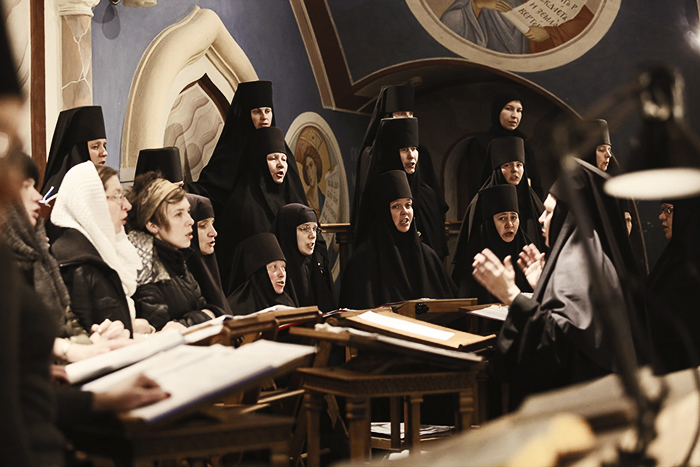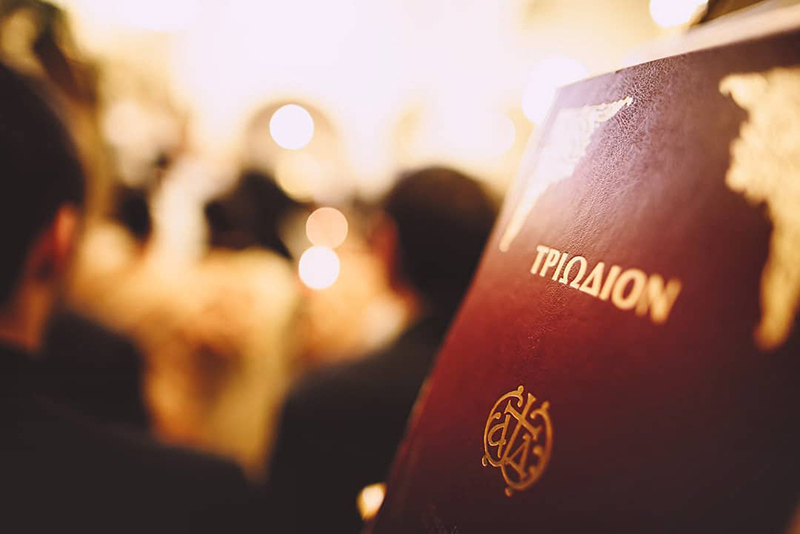
The Liturgy is the immeasurable depth and mystery of the life of the Holy Spirit in man. It contains a lot of symbols, meanings, and ideas.
One of such meanings, I think, is that at the Liturgy there is a dialogue between God and man. During the Eucharistic Canon, when the Holy Spirit transforms bread, wine and water into the Body and Blood of Christ, we can say that the Lord speaks to man. This is also true for the communion of believers, which symbolizes the Resurrection of Christ. The Savior is risen from the dead and, through the Holy Eucharist, raises us from the death of sin.
When the priest brings the Chalice back into the altar after the Eucharist, there begins another part of the Liturgy in which Man (the humankind) speaks to God. The main theme of this conversation is to thank God for all the blessings He has sent us, most notably for the salvation of the human race from the bonds of sin, death, and hell through the Redemptive Action of our Lord Jesus Christ, which is, in fact, the essence of the Divine Liturgy. It is during the Liturgy that salvation, theosis, and the intimate connection between God and man take place, when man, with the fear of God and faith, approaches the Holy Mysteries of Christ. That’s what we thank the Lord for.
This is where singing Psalm 34 is very pertinent. It is preceded by the reading of the Prayer Behind the Ambo by the priest, which begins and ends with thanksgiving to God: “Blessing those that bless thee, O Lord, and sanctifying those that trust in thee… For every good gift, and every perfect gift is from above, and cometh down from thee, the Father of lights, and unto thee do we send up glory, thanksgiving, and worship, to the Father, and to the Son, and to the Holy Spirit, now and ever, and unto ages of ages. Amen…”
The priest begins the thanksgiving as our prayer representative and an intercessor before God for the people. And then, on behalf of all the Orthodox Christians of the world, the choir joins the priest’s prayer with a unified praise and thanksgiving to the Lord.
After the Prayer Behind the Ambo, the choir says “Amen”, i.e. “verily so”, “may it be so”, and then sings Blessed be the name of the Lord now and unto the ages of ages – this beautiful hymn of praise to God three times in the glory of the Holy Trinity, , directly followed by Psalm 34.
This Psalm is best understood in its historical context. The Book of Psalms refers to the background of this Psalm thus, “A Psalm of David, when he changed his behavior before Abimelech; who drove him away, and he departed.” This story is told in 1 Samuel 21:10-15. Here Abimelech is called Achish the king of Gath. Gath is one of the Philistine towns. The Philistines were a neighboring nation in the Promised Land. The Jews often fought against the pagan Philistines. St. Basil the Great explains the difference between the name Abimelech of the Psalms and Achish of 1 Samuel. It turns out that Abimelech is not a name, but a general title of Philistine kings, just as Egyptian kings were called Pharaohs. The Philistine kings, however, had their personal names in addition to this generic title, as was the case with Achish.
Now as to why the Holy Prophet and King David wrote the 34th Psalm.
He was caught between the hammer and the anvil. On the one hand, he was persecuted by the Jewish king Saul and had to settle on the territory controlled by the Philistine king Achish. On the other hand, Achish was the king of Gath, and it was this town that Goliath, who had been defeated by David in a fair fight that was decisive in the battle between the Jews and the Philistines, came from. That battle had ended with the victory of the Jews. Therefore, the Holy Prophet knew that Achish would be willing to take revenge on him for the disgrace of the Philistines and would most likely kill him. Nevertheless, David was compelled to enter the Gath lands to escape Saul. David pretended to be insane, so that Abimelech wouldn’t touch him, and it worked: Achish let the saint go.
After David’s miraculous salvation, he was convinced of God’s Providence and the help of the Most High, who had delivered him from the hands of the wicked king, so he wrote the wonderful thanksgiving song to the Lord, known to us as Psalm 34. Nowadays, this Psalm has a universal meaning for us, especially when sung during the Liturgy. It affirms that God has delivered mankind from the devil’s bondage, from sin, and from eternal death by means of His Atonement. The Eucharist is one of the primary methods of God’s salvation for mankind. This is why we will never stop thanking God!
“I will bless the LORD at all times: his praise shall continually be in my mouth,” the first verse of this Psalm reads. It means that I will always bless and thank the Lord. It is in this prayer at the Liturgy that the human race joins the choir of angels in unceasing praise to God. Both the Triumphant Church and the Militant Church are united by the Holy Spirit, as well as by God’s love for us and our love for God. That is why we are alive!
I will bless the LORD at all times: his praise shall continually be in my mouth.
Translated by The Catalogue of Good Deeds
Source: https://pravlife.org/ru/content/pochemu-tridcat-tretiy-psalom-poetsya-v-konce-liturgii




Septuagint numbering is Psalm 33!
Dear Hieromonk Raphael, right you are!